
unitycatalog
Open, Multi-modal Catalog for Data & AI
Stars: 2770
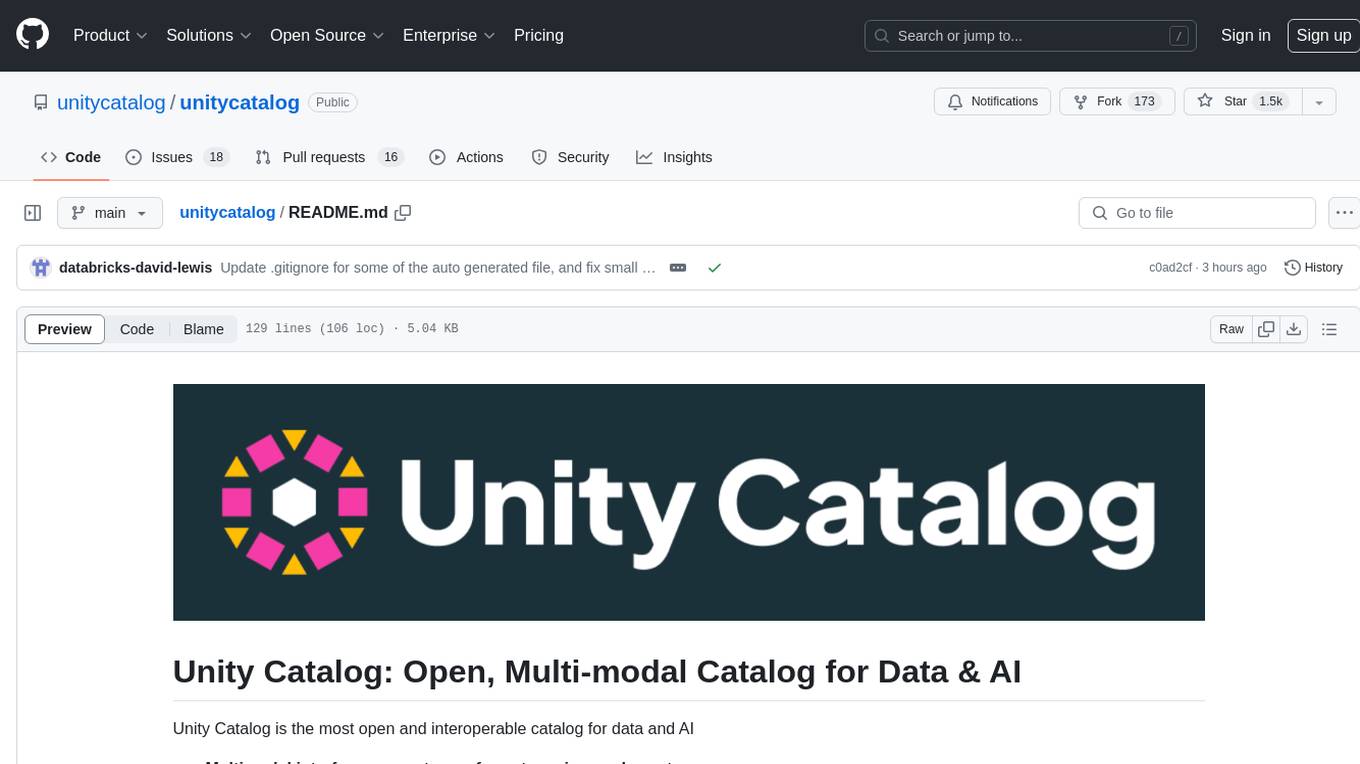
Unity Catalog is an open and interoperable catalog for data and AI, supporting multi-format tables, unstructured data, and AI assets. It offers plugin support for extensibility and interoperates with Delta Sharing protocol. The catalog is fully open with OpenAPI spec and OSS implementation, providing unified governance for data and AI with asset-level access control enforced through REST APIs.
README:
Unity Catalog is the industry’s only universal catalog for data and AI.
-
Multimodal interface supports any format, engine, and asset
- Multi-format support: It is extensible and supports Delta Lake, Apache Iceberg and Apache Hudi via UniForm, Apache Parquet, JSON, CSV, and many others.
- Multi-engine support: With its open APIs, data cataloged in Unity can be read by many leading compute engines.
- Multimodal: It supports all your data and AI assets, including tables, files, functions, AI models.
- Open source API and implementation - OpenAPI spec and OSS implementation (Apache 2.0 license). It is also compatible with Apache Hive's metastore API and Apache Iceberg's REST catalog API. Unity Catalog is currently a sandbox project with LF AI and Data Foundation (part of the Linux Foundation).
- Unified governance for data and AI - Govern and secure tabular data, unstructured assets, and AI assets with a single interface.
The first release of Unity Catalog focuses on a core set of APIs for tables, unstructured data, and AI assets - with more to come soon on governance, access, and client interoperability. This is just the beginning!
This is a community effort. Unity Catalog is supported by
- Amazon Web Services
- Confluent
- Daft (Eventual)
- dbt Labs
- DuckDB
- Fivetran
- Google Cloud
- Granica
- Immuta
- Informatica
- LanceDB
- LangChain
- LlamaIndex
- Microsoft Azure
- NVIDIA
- Onehouse
- PuppyGraph
- Salesforce
- StarRocks (CelerData)
- Spice AI
- Tecton
- Unstructured
Unity Catalog is proud to be hosted by the LF AI & Data Foundation.

Let's take Unity Catalog for spin. In this guide, we are going to do the following:
- In one terminal, run the UC server.
- In another terminal, we will explore the contents of the UC server using a CLI. An example project is provided to demonstrate how to use the UC SDK for various assets as well as provide a convenient way to explore the content of any UC server implementation.
If you prefer to run Unity Catalog in Docker use
docker compose up. See the Docker Compose docs for more details.
You have to ensure that your local environment has the following:
- Clone this repository.
- Ensure the
JAVA_HOMEenvironment variable your terminal is configured to point to JDK17. - Compile the project using
build/sbt package
In a terminal, in the cloned repository root directory, start the UC server.
bin/start-uc-serverFor the remaining steps, continue in a different terminal.
Let's list the tables.
bin/uc table list --catalog unity --schema defaultYou should see a few tables. Some details are truncated because of the nested nature of the data.
To see all the content, you can add --output jsonPretty to any command.
Next, let's get the metadata of one of those tables.
bin/uc table get --full_name unity.default.numbersYou can see that it is a Delta table. Now, specifically for Delta tables, this CLI can print a snippet of the contents of a Delta table (powered by the Delta Kernel Java project). Let's try that.
bin/uc table read --full_name unity.default.numbersFor operating on tables with DuckDB, you will have to install it (version 1.0).
Let's start DuckDB and install a couple of extensions. To start DuckDB, run the command duckdb in the terminal.
Then, in the DuckDB shell, run the following commands:
install uc_catalog from core_nightly;
load uc_catalog;
install delta;
load delta;If you have installed these extensions before, you may have to run update extensions and restart DuckDB
for the following steps to work.
Now that we have DuckDB all set up, let's try connecting to UC by specifying a secret.
CREATE SECRET (
TYPE UC,
TOKEN 'not-used',
ENDPOINT 'http://127.0.0.1:8080',
AWS_REGION 'us-east-2'
);You should see it print a short table saying Success = true. Then we attach the unity catalog to DuckDB.
ATTACH 'unity' AS unity (TYPE UC_CATALOG);Now we are ready to query. Try the following:
SHOW ALL TABLES;
SELECT * from unity.default.numbers;You should see the tables listed and the contents of the numbers table printed.
To quit DuckDB, press Ctrl+D (if your platform supports it), press Ctrl+C, or use the .exit command in the DuckDB shell.
To use the Unity Catalog UI, start a new terminal and ensure you have already started the UC server (e.g., ./bin/start-uc-server)
Prerequisites
- Node: https://nodejs.org/en/download/package-manager
- Yarn: https://classic.yarnpkg.com/lang/en/docs/install
How to start the UI through yarn
cd /ui
yarn install
yarn start
You can interact with a Unity Catalog server to create and manage catalogs, schemas and tables, operate on volumes and functions from the CLI, and much more. See the cli usage for more details.
- Open API specification: See the Unity Catalog Rest API.
- Compatibility and stability: The APIs are currently evolving and should not be assumed to be stable.
Unity Catalog can be built using sbt.
To build UC (incl. Spark Integration module), run the following command:
build/sbt clean package publishLocal spark/publishLocalRefer to sbt docs for more commands.
- To create a tarball that can be used to deploy the UC server or run the CLI, run the following:
This will create a tarball in the
build/sbt createTarball
targetdirectory. See the full deployment guide for more details.
- Install JDK 17 by whatever mechanism is appropriate for your system, and
set that version to be the default Java version (e.g. via the env variable
JAVA_HOME) - To compile all the code without running tests, run the following:
build/sbt clean compile
- To compile and execute tests, run the following:
build/sbt -J-Xmx2G clean test - To execute tests with coverage, run the following:
build/sbt -J-Xmx2G jacoco
- To update the API specification, just update the
api/all.yamland then run the following:This will regenerate the OpenAPI data models in the UC server and data models + APIs in the client SDK.build/sbt generate
- To format the code, run the following:
build/sbt javafmtAll
IntelliJ is the recommended IDE to use when developing Unity Catalog. The below steps outline how to add the project to IntelliJ:
- Clone Unity Catalog into a local folder, such as
~/unitycatalog. - Select
File>New Project>Project from Existing Sources...and select~/unitycatalog. - Under
Import project from external modelselectsbt. ClickNext. - Click
Finish.
Java code adheres to the Google style, which is verified via build/sbt javafmtCheckAll during builds.
In order to automatically fix Java code style issues, please use build/sbt javafmtAll.
Follow the instructions for Eclipse or IntelliJ to install the google-java-format plugin (note the required manual actions for IntelliJ).
The build script checks for a lower bound on the JDK but the current SBT version imposes an upper bound. Please check the JDK compatibility documentation for more information
For an overview of how to contribute to the documentation, please see our introduction here. For the official documentation, please take a look at https://docs.unitycatalog.io/.
For Tasks:
Click tags to check more tools for each tasksFor Jobs:
Alternative AI tools for unitycatalog
Similar Open Source Tools

unitycatalog
Unity Catalog is an open and interoperable catalog for data and AI, supporting multi-format tables, unstructured data, and AI assets. It offers plugin support for extensibility and interoperates with Delta Sharing protocol. The catalog is fully open with OpenAPI spec and OSS implementation, providing unified governance for data and AI with asset-level access control enforced through REST APIs.
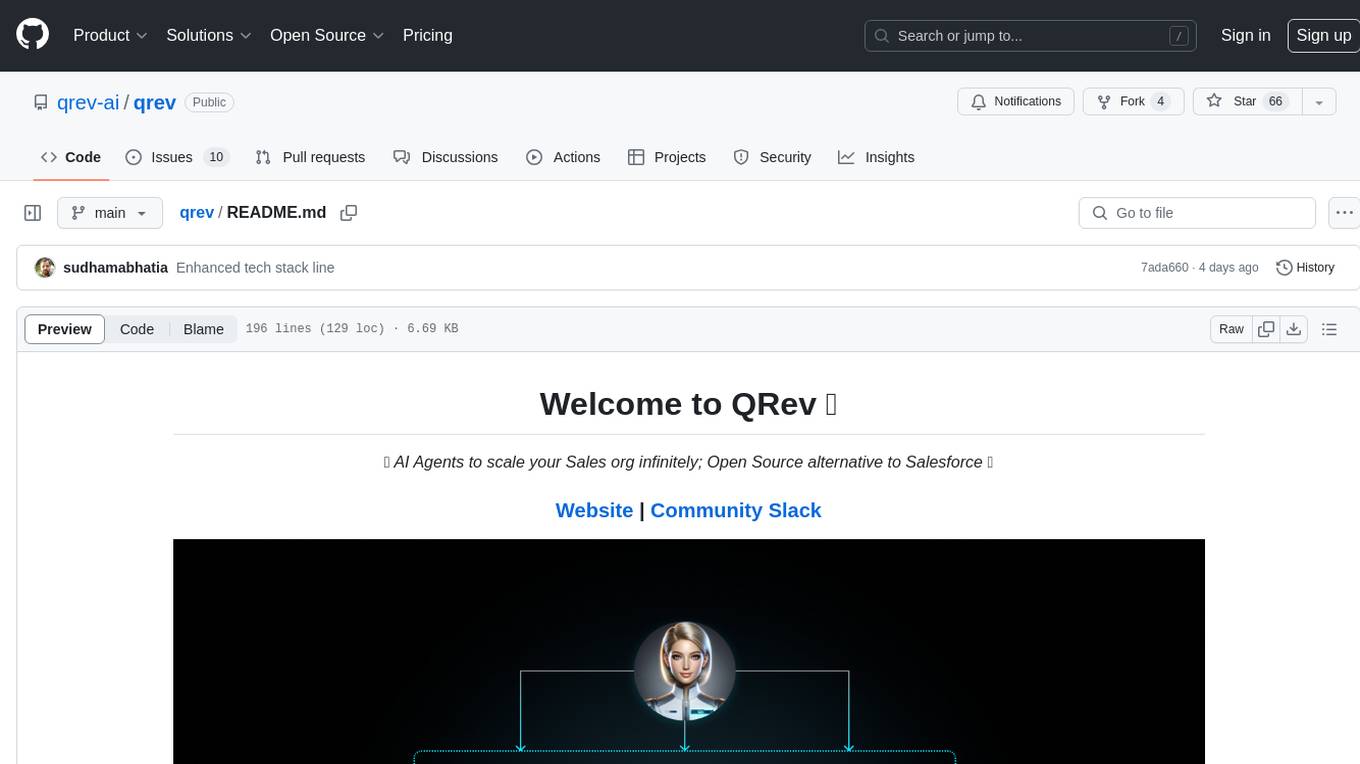
qrev
QRev is an open-source alternative to Salesforce, offering AI agents to scale sales organizations infinitely. It aims to provide digital workers for various sales roles or a superagent named Qai. The tech stack includes TypeScript for frontend, NodeJS for backend, MongoDB for app server database, ChromaDB for vector database, SQLite for AI server SQL relational database, and Langchain for LLM tooling. The tool allows users to run client app, app server, and AI server components. It requires Node.js and MongoDB to be installed, and provides detailed setup instructions in the README file.
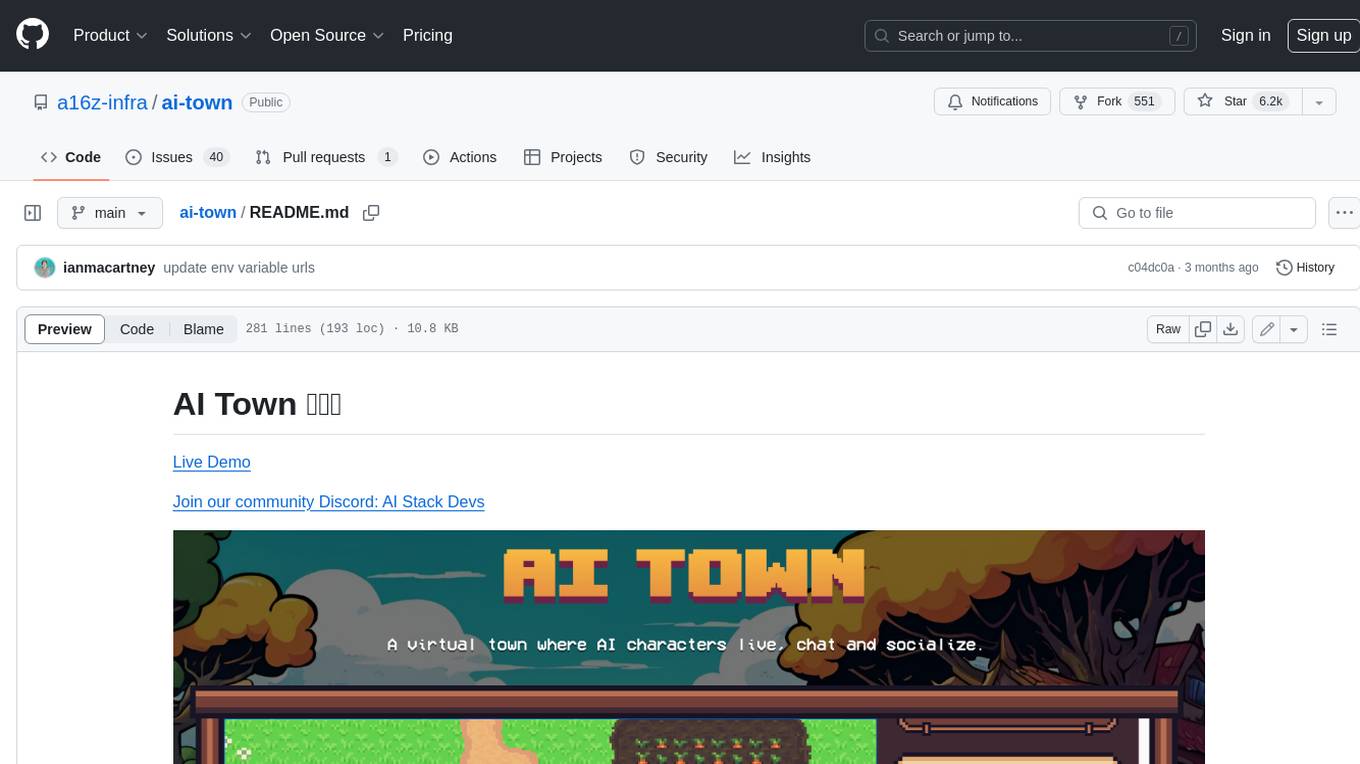
ai-town
AI Town is a virtual town where AI characters live, chat, and socialize. This project provides a deployable starter kit for building and customizing your own version of AI Town. It features a game engine, database, vector search, auth, text model, deployment, pixel art generation, background music generation, and local inference. You can customize your own simulation by creating characters and stories, updating spritesheets, changing the background, and modifying the background music.
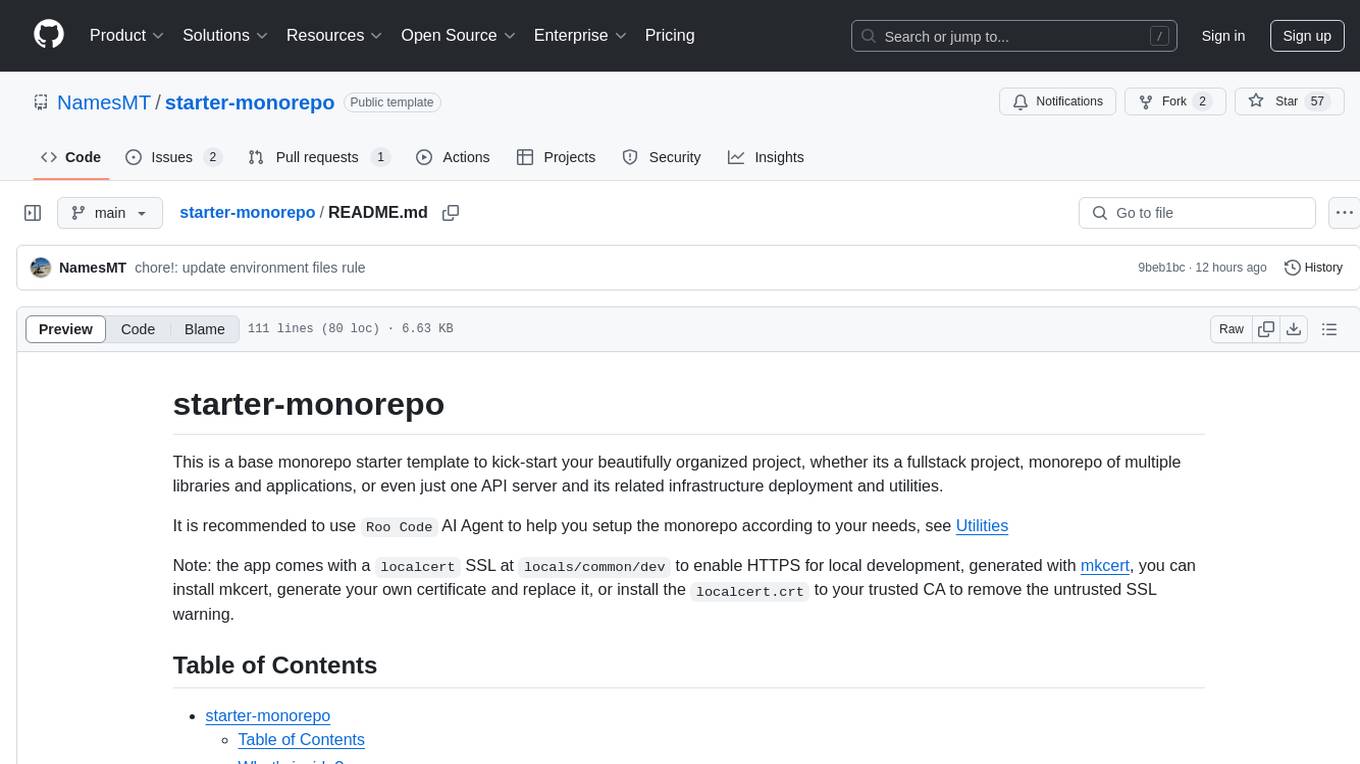
starter-monorepo
Starter Monorepo is a template repository for setting up a monorepo structure in your project. It provides a basic setup with configurations for managing multiple packages within a single repository. This template includes tools for package management, versioning, testing, and deployment. By using this template, you can streamline your development process, improve code sharing, and simplify dependency management across your project. Whether you are working on a small project or a large-scale application, Starter Monorepo can help you organize your codebase efficiently and enhance collaboration among team members.
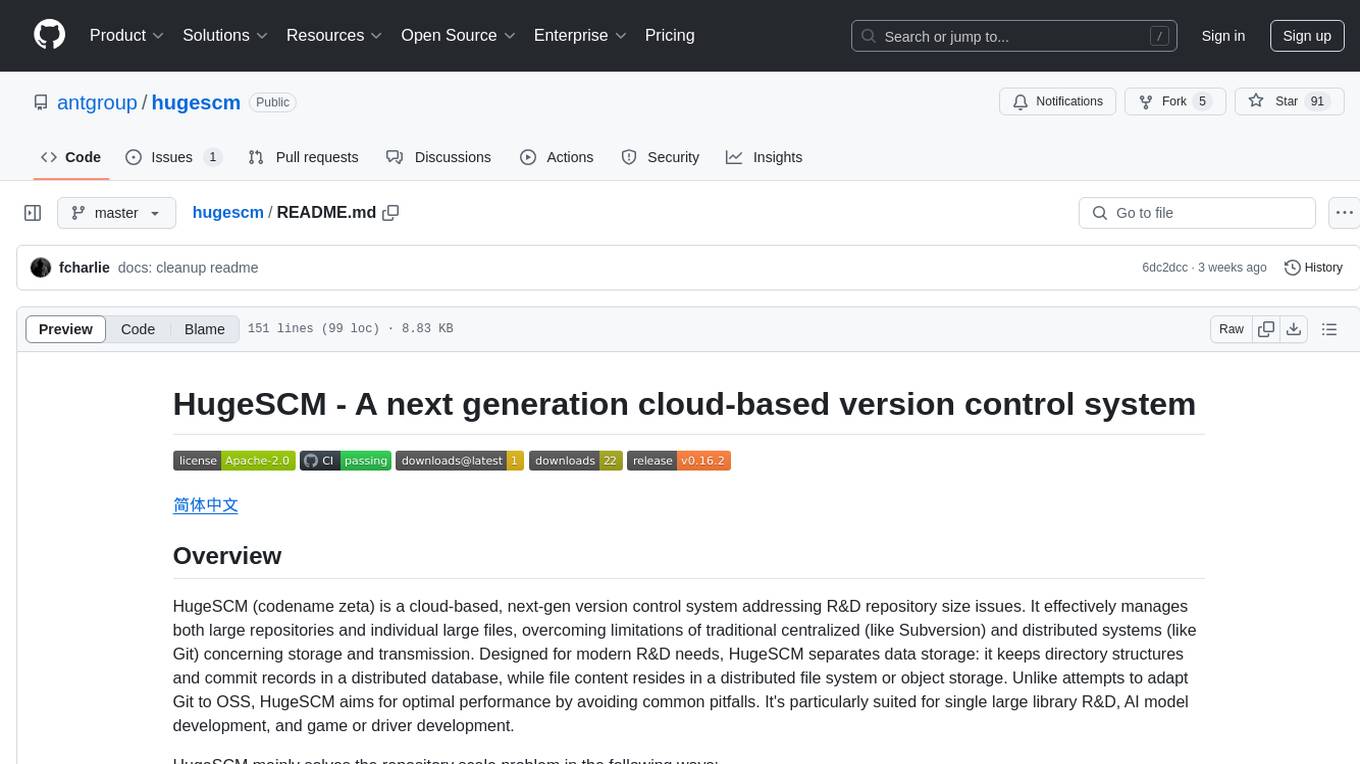
hugescm
HugeSCM is a cloud-based version control system designed to address R&D repository size issues. It effectively manages large repositories and individual large files by separating data storage and utilizing advanced algorithms and data structures. It aims for optimal performance in handling version control operations of large-scale repositories, making it suitable for single large library R&D, AI model development, and game or driver development.
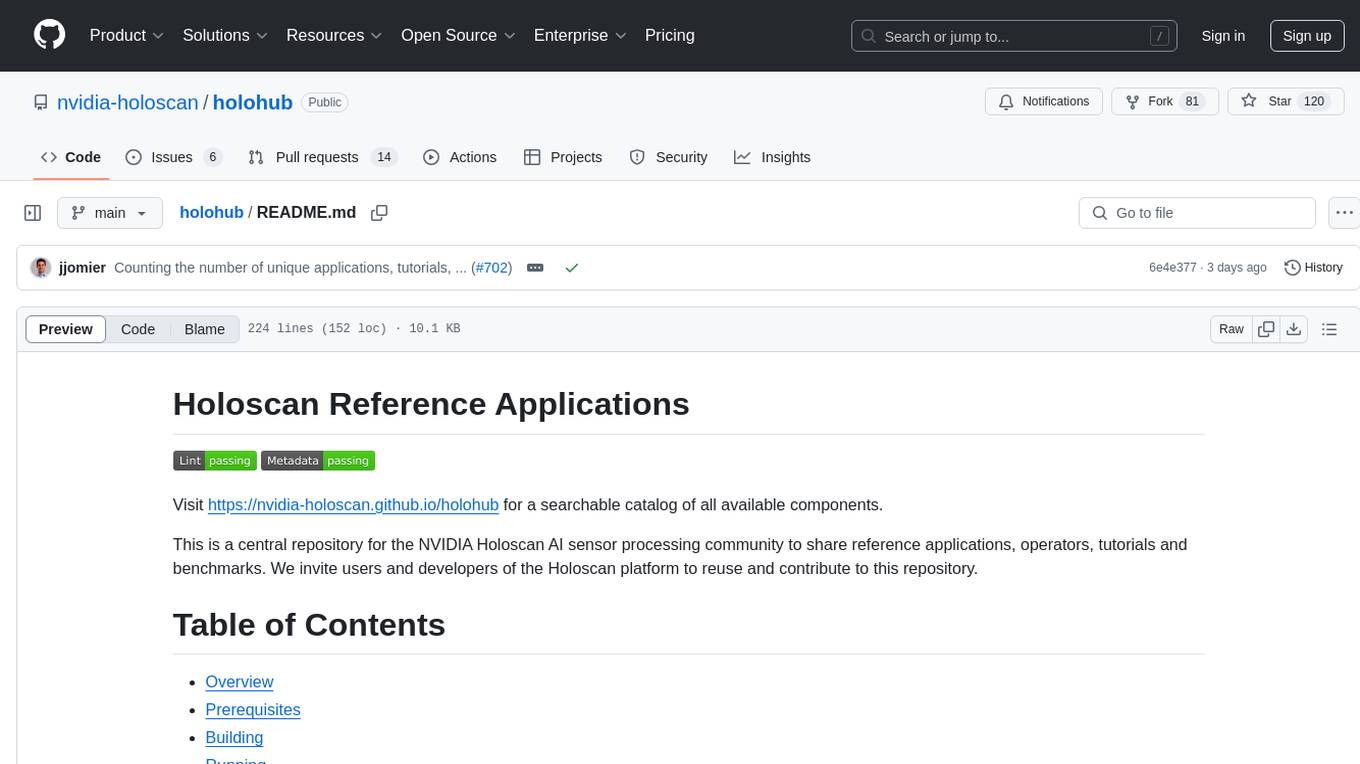
holohub
Holohub is a central repository for the NVIDIA Holoscan AI sensor processing community to share reference applications, operators, tutorials, and benchmarks. It includes example applications, community components, package configurations, and tutorials. Users and developers of the Holoscan platform are invited to reuse and contribute to this repository. The repository provides detailed instructions on prerequisites, building, running applications, contributing, and glossary terms. It also offers a searchable catalog of available components on the Holoscan SDK User Guide website.
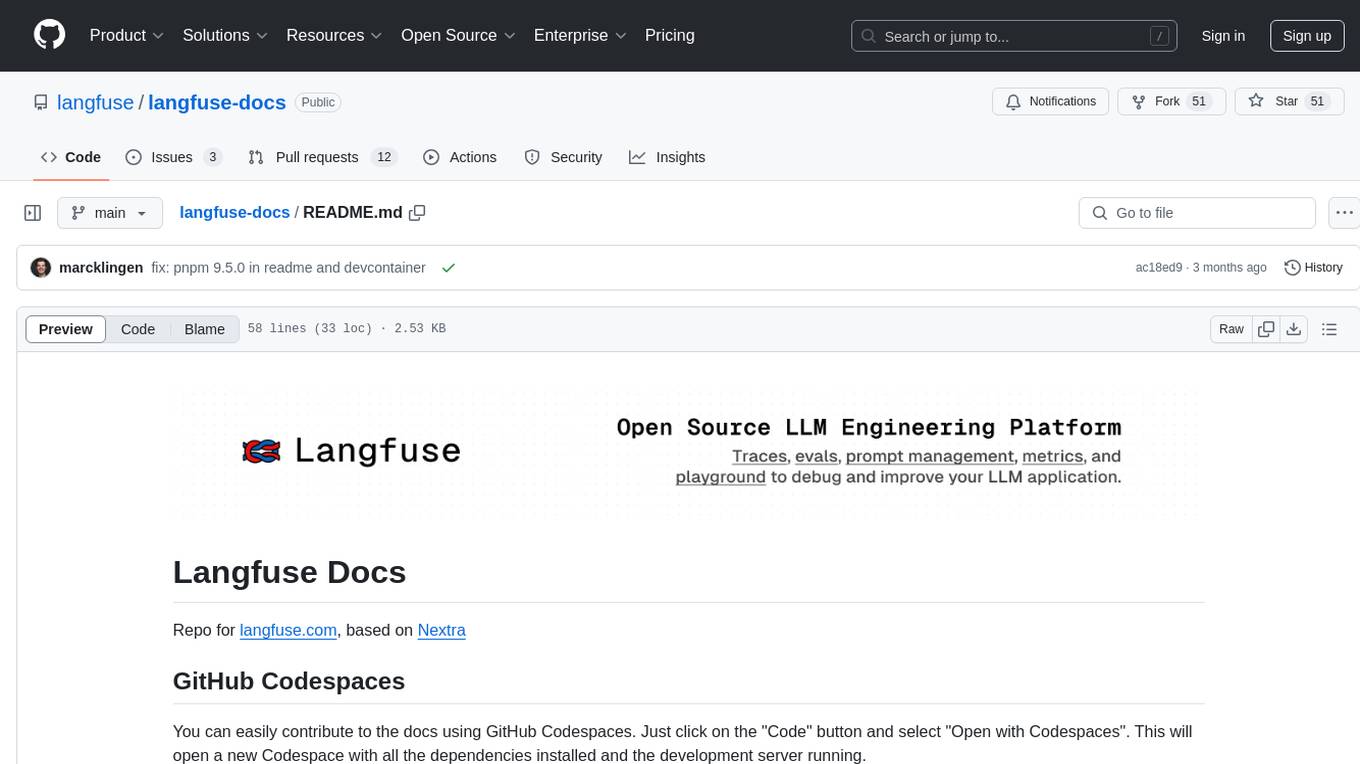
langfuse-docs
Langfuse Docs is a repository for langfuse.com, built on Nextra. It provides guidelines for contributing to the documentation using GitHub Codespaces and local development setup. The repository includes Python cookbooks in Jupyter notebooks format, which are converted to markdown for rendering on the site. It also covers media management for images, videos, and gifs. The stack includes Nextra, Next.js, shadcn/ui, and Tailwind CSS. Additionally, there is a bundle analysis feature to analyze the production build bundle size using @next/bundle-analyzer.
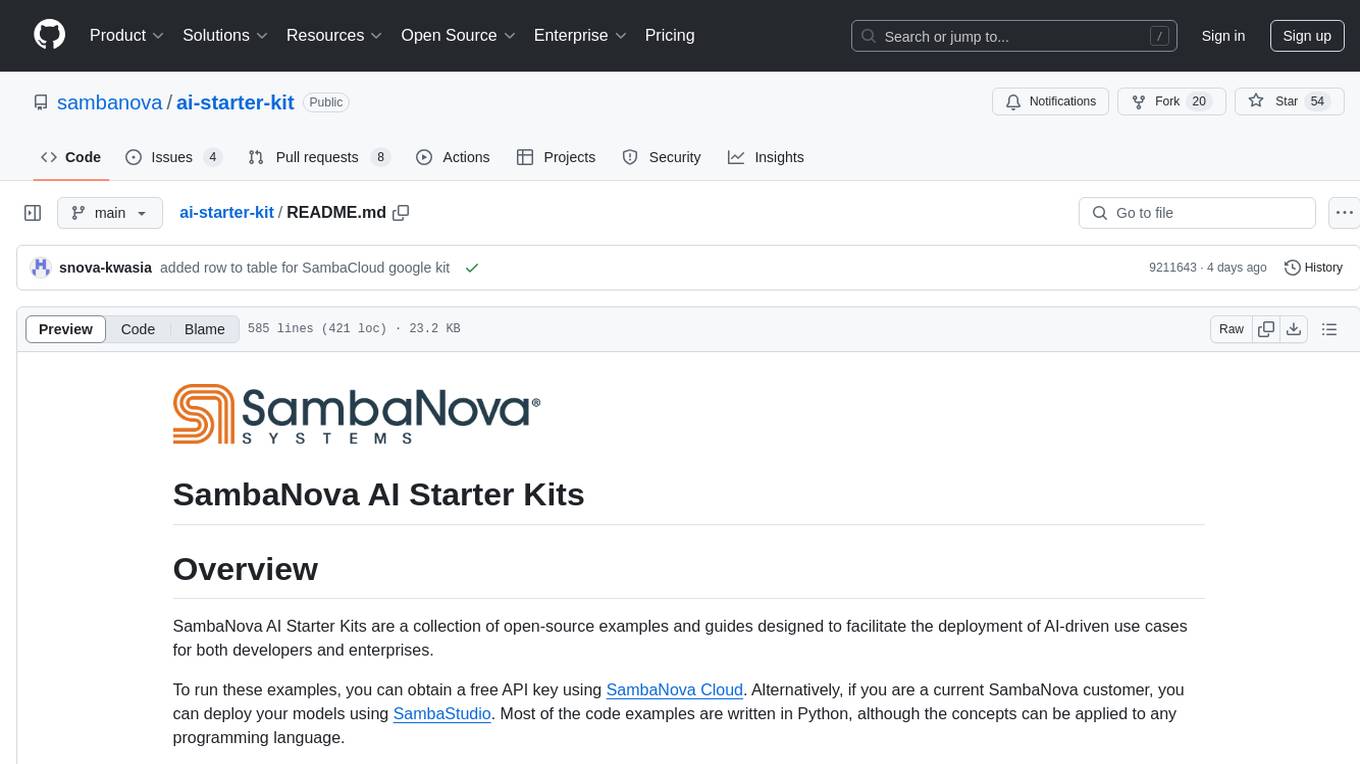
ai-starter-kit
SambaNova AI Starter Kits is a collection of open-source examples and guides designed to facilitate the deployment of AI-driven use cases for developers and enterprises. The kits cover various categories such as Data Ingestion & Preparation, Model Development & Optimization, Intelligent Information Retrieval, and Advanced AI Capabilities. Users can obtain a free API key using SambaNova Cloud or deploy models using SambaStudio. Most examples are written in Python but can be applied to any programming language. The kits provide resources for tasks like text extraction, fine-tuning embeddings, prompt engineering, question-answering, image search, post-call analysis, and more.
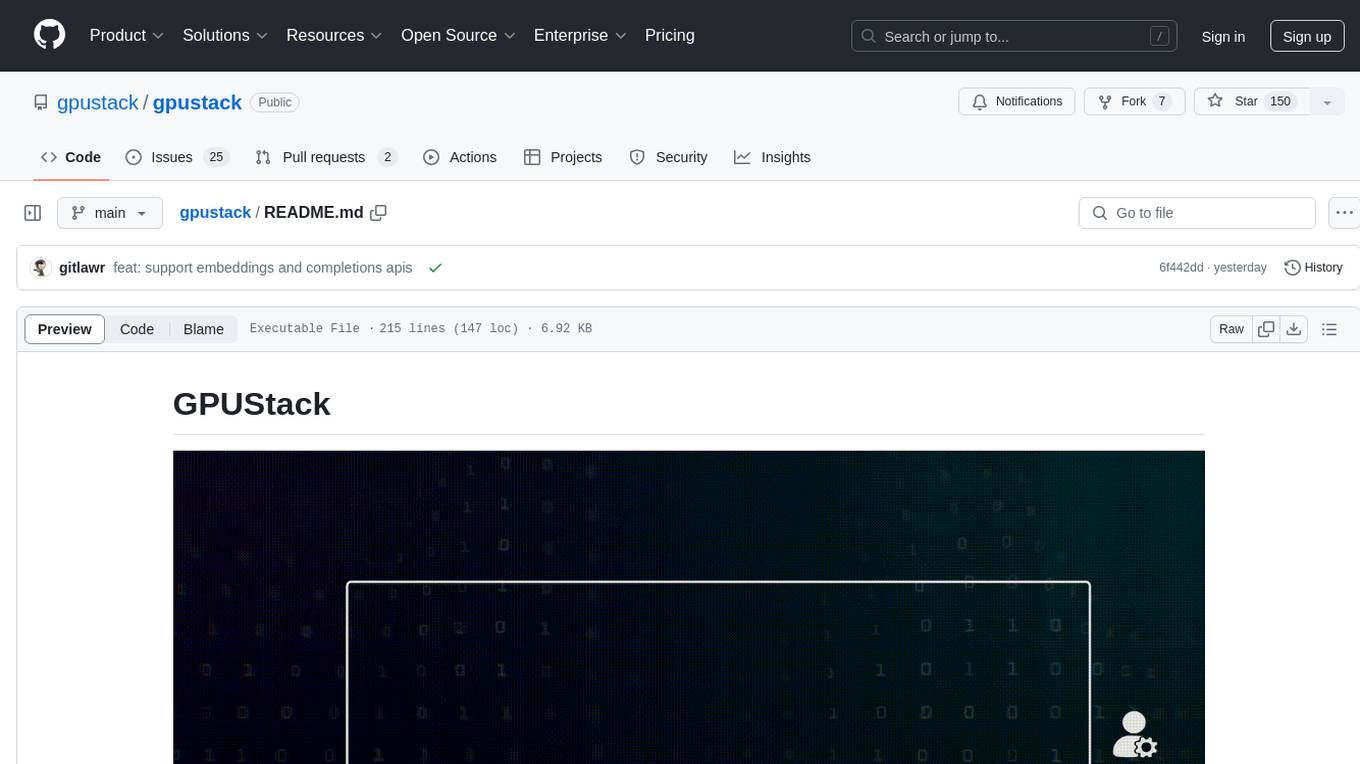
gpustack
GPUStack is an open-source GPU cluster manager designed for running large language models (LLMs). It supports a wide variety of hardware, scales with GPU inventory, offers lightweight Python package with minimal dependencies, provides OpenAI-compatible APIs, simplifies user and API key management, enables GPU metrics monitoring, and facilitates token usage and rate metrics tracking. The tool is suitable for managing GPU clusters efficiently and effectively.
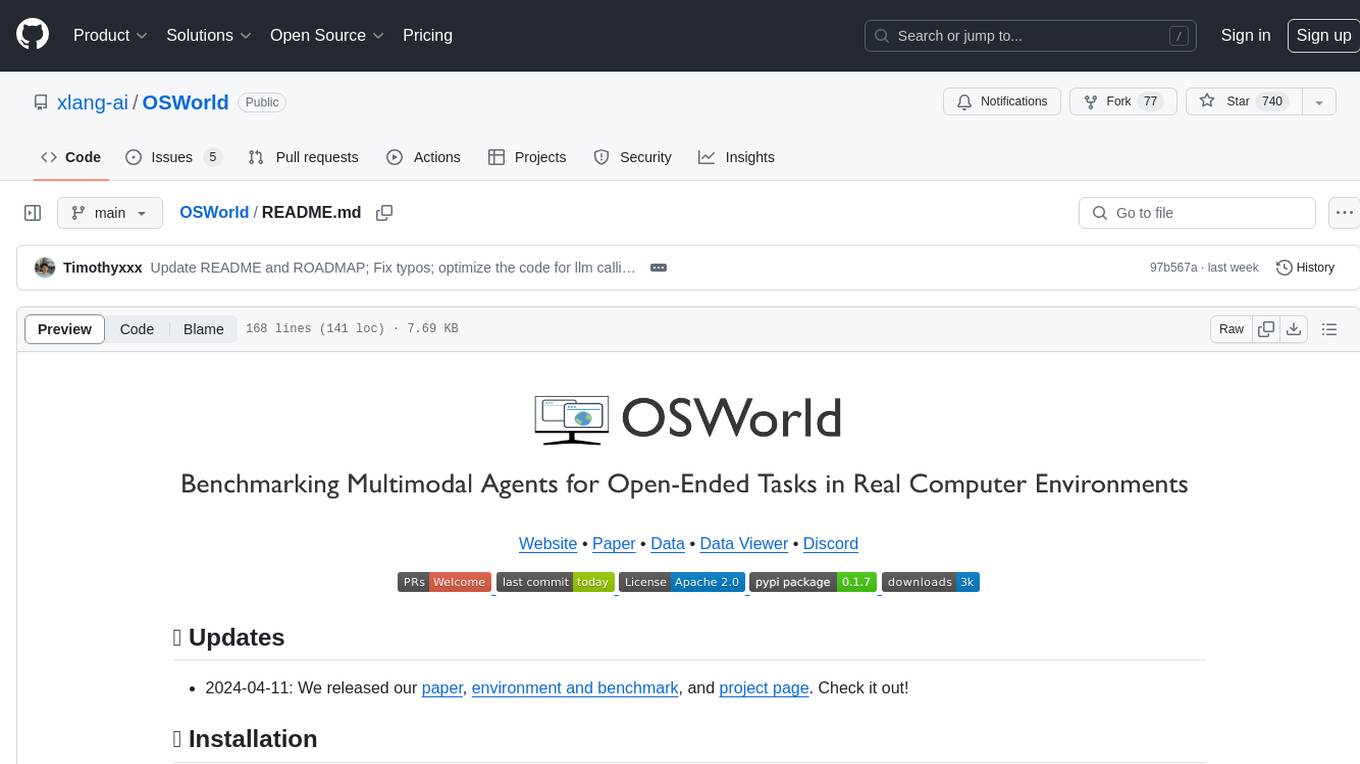
OSWorld
OSWorld is a benchmarking tool designed to evaluate multimodal agents for open-ended tasks in real computer environments. It provides a platform for running experiments, setting up virtual machines, and interacting with the environment using Python scripts. Users can install the tool on their desktop or server, manage dependencies with Conda, and run benchmark tasks. The tool supports actions like executing commands, checking for specific results, and evaluating agent performance. OSWorld aims to facilitate research in AI by providing a standardized environment for testing and comparing different agent baselines.
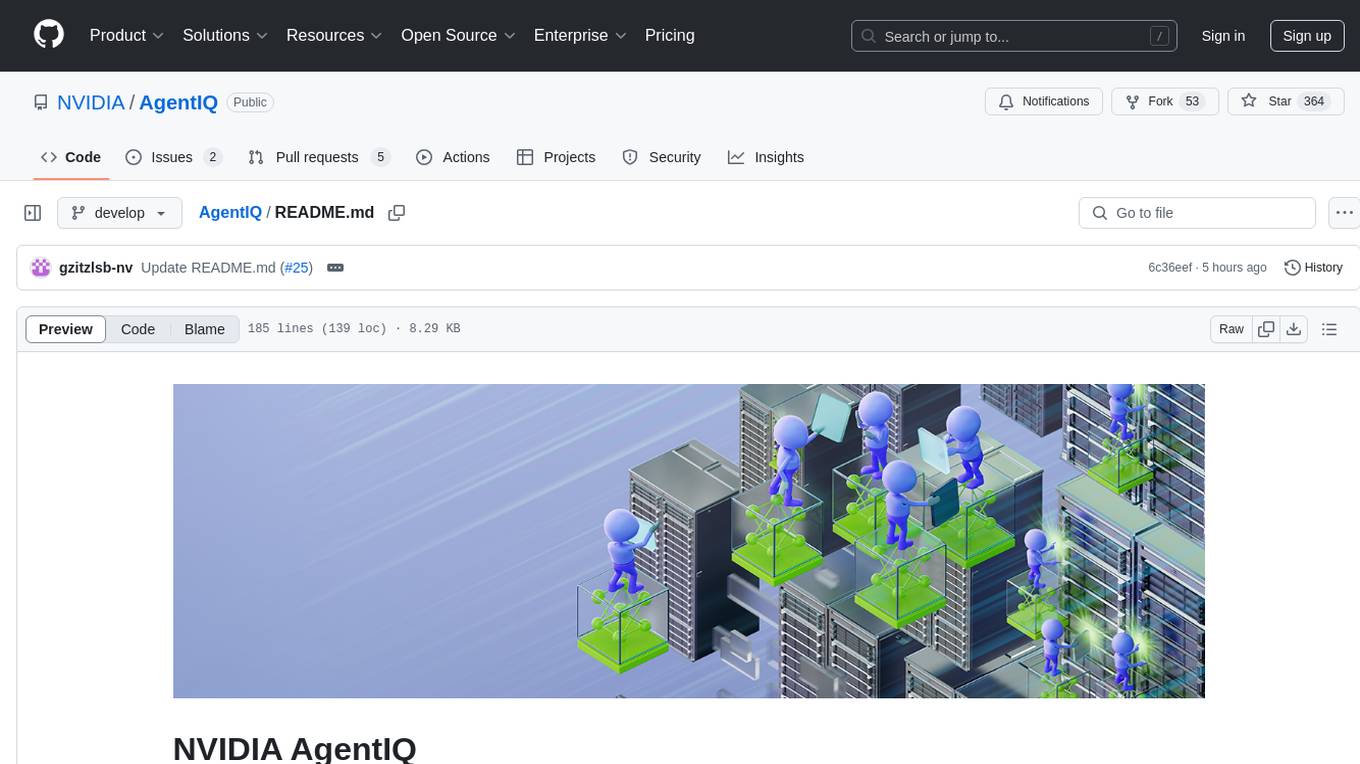
AgentIQ
AgentIQ is a flexible library designed to seamlessly integrate enterprise agents with various data sources and tools. It enables true composability by treating agents, tools, and workflows as simple function calls. With features like framework agnosticism, reusability, rapid development, profiling, observability, evaluation system, user interface, and MCP compatibility, AgentIQ empowers developers to move quickly, experiment freely, and ensure reliability across agent-driven projects.

fasttrackml
FastTrackML is an experiment tracking server focused on speed and scalability, fully compatible with MLFlow. It provides a user-friendly interface to track and visualize your machine learning experiments, making it easy to compare different models and identify the best performing ones. FastTrackML is open source and can be easily installed and run with pip or Docker. It is also compatible with the MLFlow Python package, making it easy to integrate with your existing MLFlow workflows.
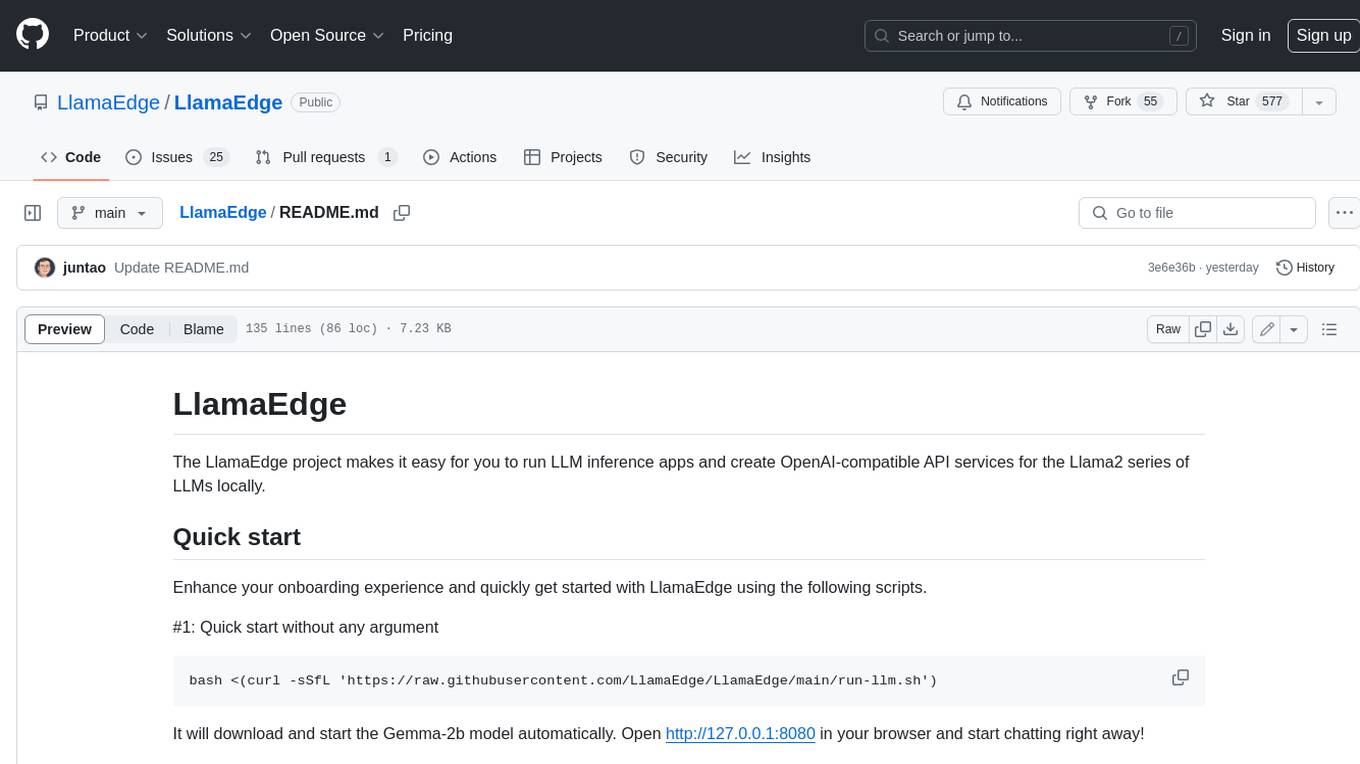
LlamaEdge
The LlamaEdge project makes it easy to run LLM inference apps and create OpenAI-compatible API services for the Llama2 series of LLMs locally. It provides a Rust+Wasm stack for fast, portable, and secure LLM inference on heterogeneous edge devices. The project includes source code for text generation, chatbot, and API server applications, supporting all LLMs based on the llama2 framework in the GGUF format. LlamaEdge is committed to continuously testing and validating new open-source models and offers a list of supported models with download links and startup commands. It is cross-platform, supporting various OSes, CPUs, and GPUs, and provides troubleshooting tips for common errors.
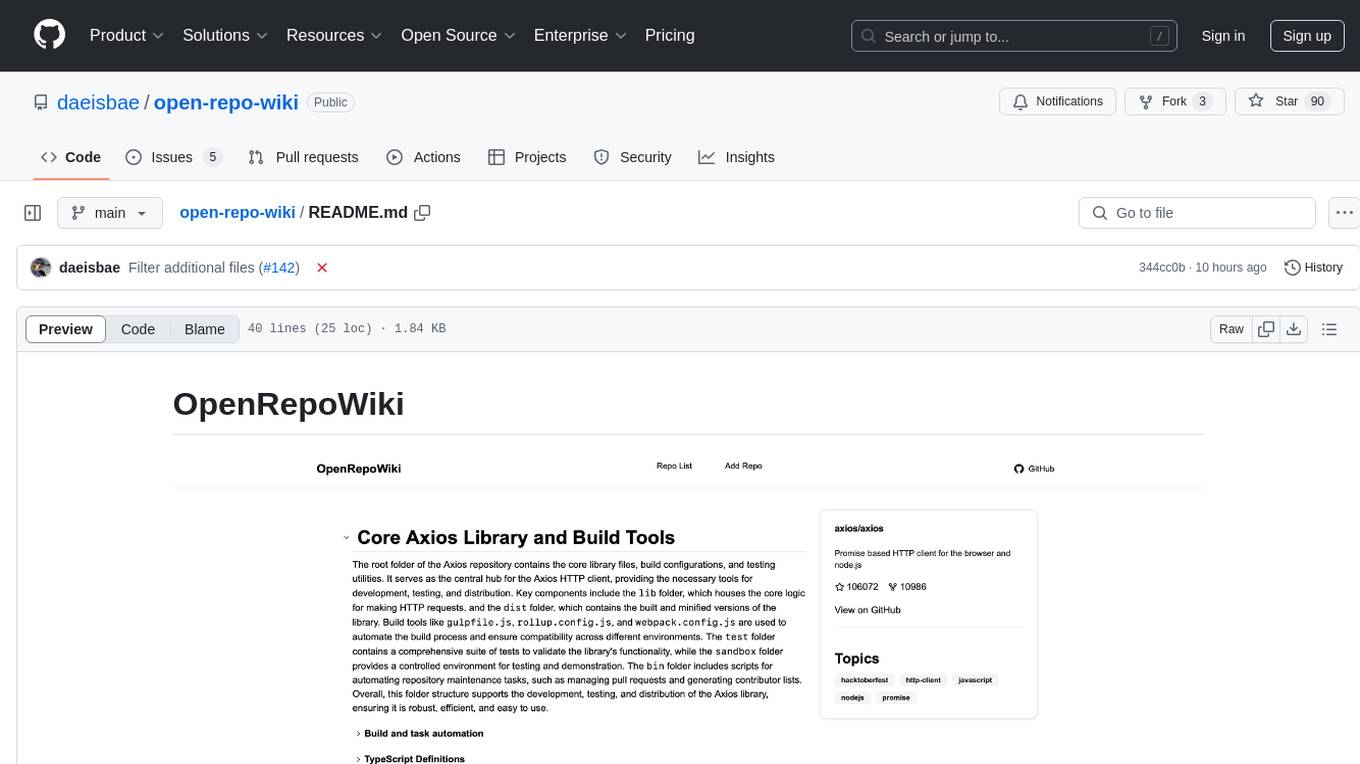
open-repo-wiki
OpenRepoWiki is a tool designed to automatically generate a comprehensive wiki page for any GitHub repository. It simplifies the process of understanding the purpose, functionality, and core components of a repository by analyzing its code structure, identifying key files and functions, and providing explanations. The tool aims to assist individuals who want to learn how to build various projects by providing a summarized overview of the repository's contents. OpenRepoWiki requires certain dependencies such as Google AI Studio or Deepseek API Key, PostgreSQL for storing repository information, Github API Key for accessing repository data, and Amazon S3 for optional usage. Users can configure the tool by setting up environment variables, installing dependencies, building the server, and running the application. It is recommended to consider the token usage and opt for cost-effective options when utilizing the tool.
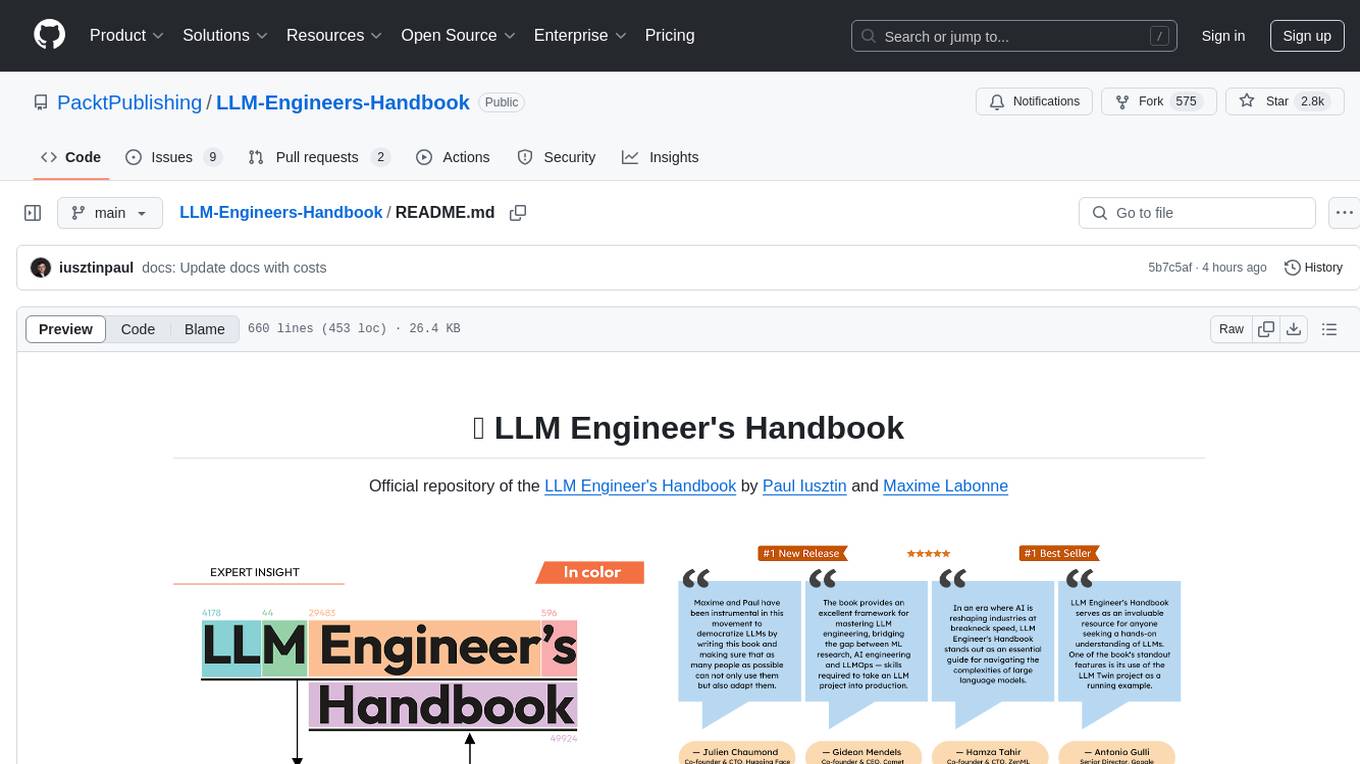
LLM-Engineers-Handbook
The LLM Engineer's Handbook is an official repository containing a comprehensive guide on creating an end-to-end LLM-based system using best practices. It covers data collection & generation, LLM training pipeline, a simple RAG system, production-ready AWS deployment, comprehensive monitoring, and testing and evaluation framework. The repository includes detailed instructions on setting up local and cloud dependencies, project structure, installation steps, infrastructure setup, pipelines for data processing, training, and inference, as well as QA, tests, and running the project end-to-end.
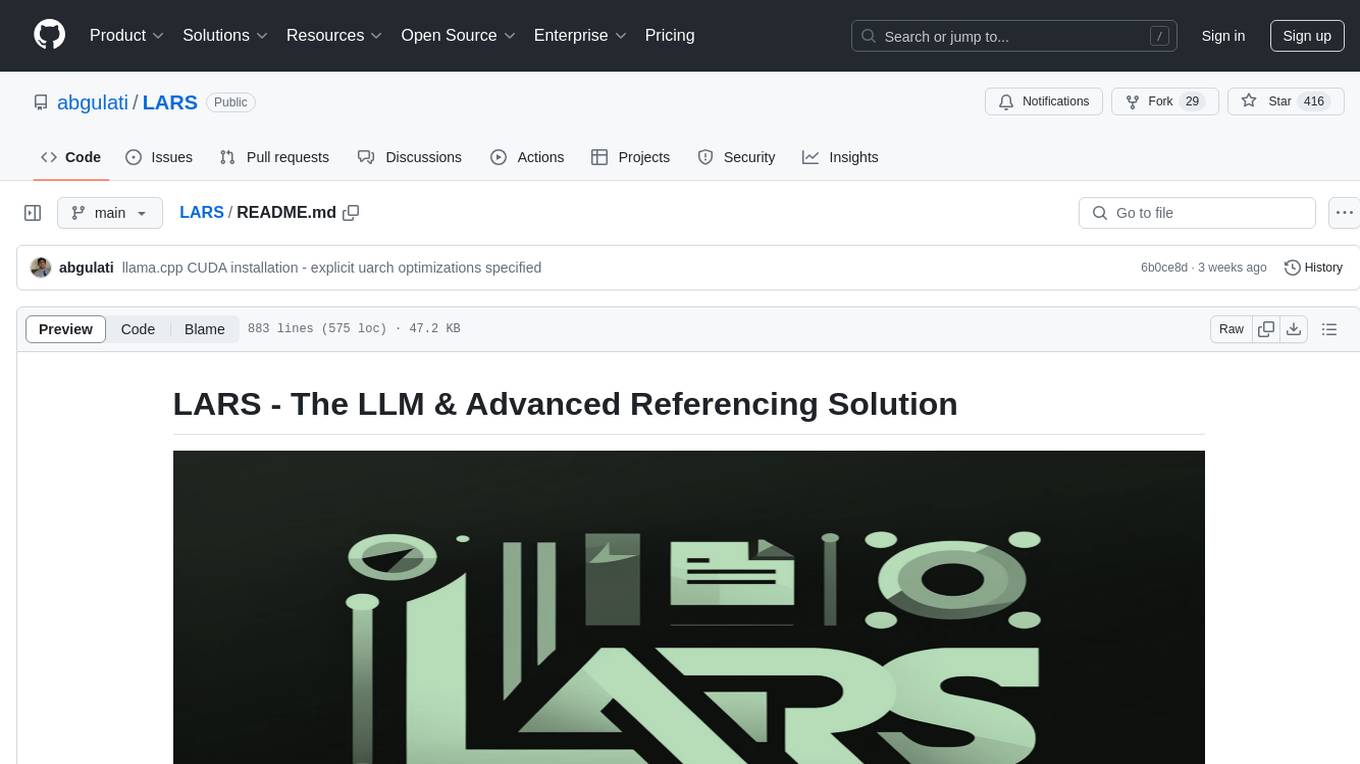
LARS
LARS is an application that enables users to run Large Language Models (LLMs) locally on their devices, upload their own documents, and engage in conversations where the LLM grounds its responses with the uploaded content. The application focuses on Retrieval Augmented Generation (RAG) to increase accuracy and reduce AI-generated inaccuracies. LARS provides advanced citations, supports various file formats, allows follow-up questions, provides full chat history, and offers customization options for LLM settings. Users can force enable or disable RAG, change system prompts, and tweak advanced LLM settings. The application also supports GPU-accelerated inferencing, multiple embedding models, and text extraction methods. LARS is open-source and aims to be the ultimate RAG-centric LLM application.
For similar tasks

unitycatalog
Unity Catalog is an open and interoperable catalog for data and AI, supporting multi-format tables, unstructured data, and AI assets. It offers plugin support for extensibility and interoperates with Delta Sharing protocol. The catalog is fully open with OpenAPI spec and OSS implementation, providing unified governance for data and AI with asset-level access control enforced through REST APIs.

pandas-ai
PandasAI is a Python library that makes it easy to ask questions to your data in natural language. It helps you to explore, clean, and analyze your data using generative AI.
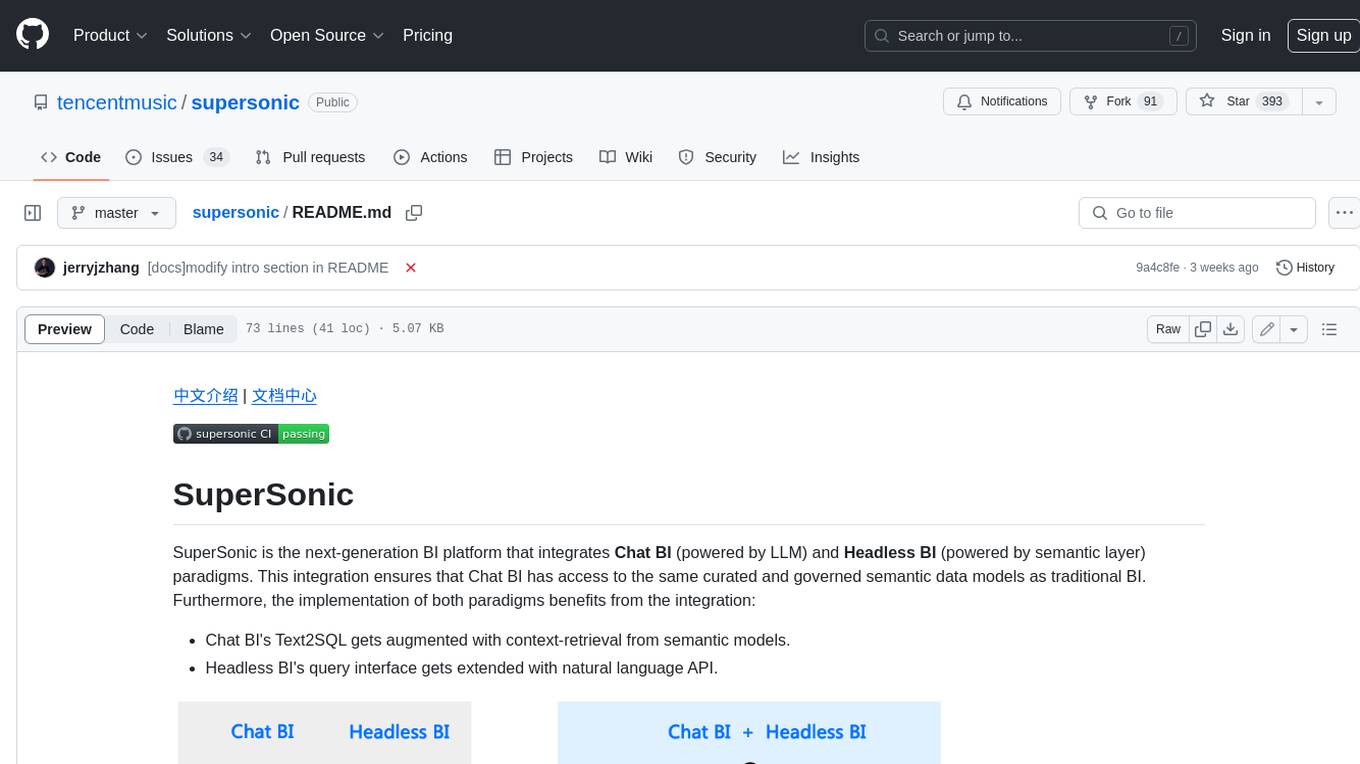
supersonic
SuperSonic is a next-generation BI platform that integrates Chat BI (powered by LLM) and Headless BI (powered by semantic layer) paradigms. This integration ensures that Chat BI has access to the same curated and governed semantic data models as traditional BI. Furthermore, the implementation of both paradigms benefits from the integration: * Chat BI's Text2SQL gets augmented with context-retrieval from semantic models. * Headless BI's query interface gets extended with natural language API. SuperSonic provides a Chat BI interface that empowers users to query data using natural language and visualize the results with suitable charts. To enable such experience, the only thing necessary is to build logical semantic models (definition of metric/dimension/tag, along with their meaning and relationships) through a Headless BI interface. Meanwhile, SuperSonic is designed to be extensible and composable, allowing custom implementations to be added and configured with Java SPI. The integration of Chat BI and Headless BI has the potential to enhance the Text2SQL generation in two dimensions: 1. Incorporate data semantics (such as business terms, column values, etc.) into the prompt, enabling LLM to better understand the semantics and reduce hallucination. 2. Offload the generation of advanced SQL syntax (such as join, formula, etc.) from LLM to the semantic layer to reduce complexity. With these ideas in mind, we develop SuperSonic as a practical reference implementation and use it to power our real-world products. Additionally, to facilitate further development we decide to open source SuperSonic as an extensible framework.
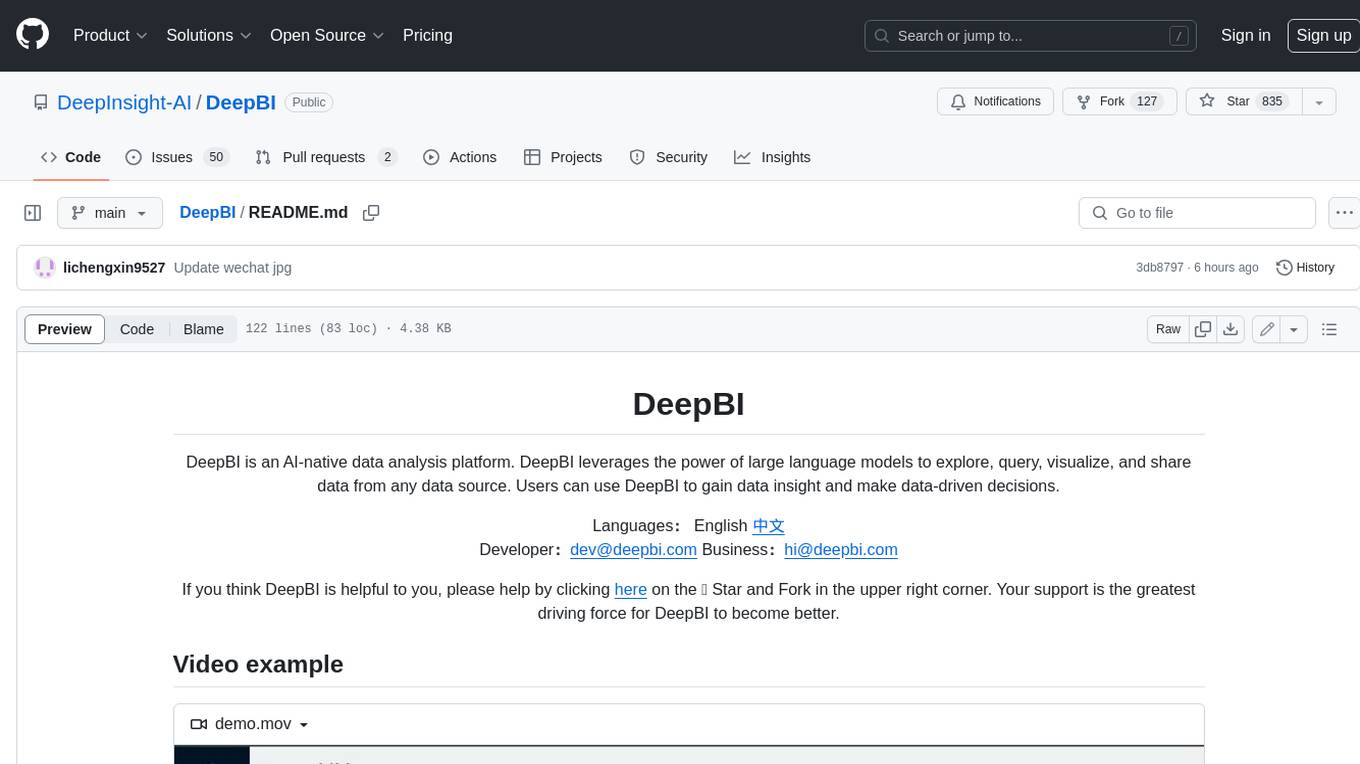
DeepBI
DeepBI is an AI-native data analysis platform that leverages the power of large language models to explore, query, visualize, and share data from any data source. Users can use DeepBI to gain data insight and make data-driven decisions.
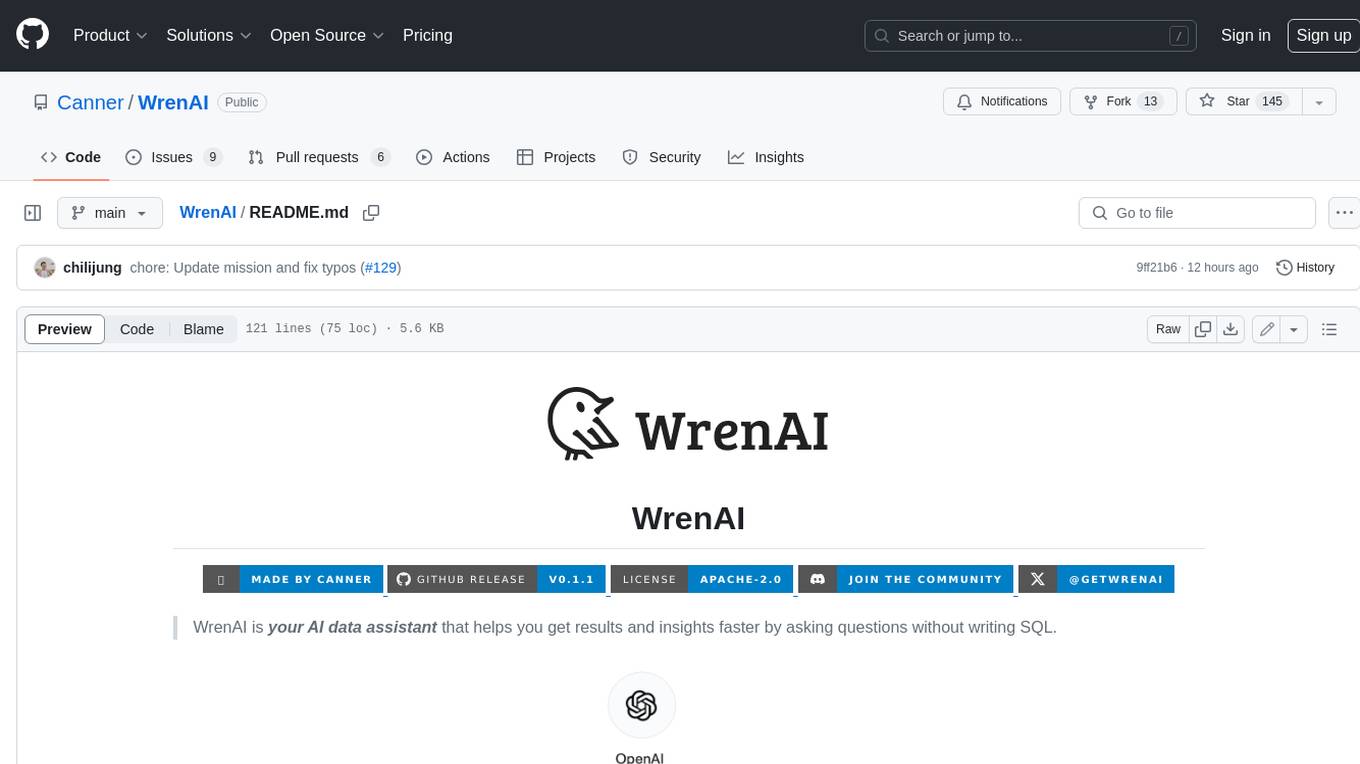
WrenAI
WrenAI is a data assistant tool that helps users get results and insights faster by asking questions in natural language, without writing SQL. It leverages Large Language Models (LLM) with Retrieval-Augmented Generation (RAG) technology to enhance comprehension of internal data. Key benefits include fast onboarding, secure design, and open-source availability. WrenAI consists of three core services: Wren UI (intuitive user interface), Wren AI Service (processes queries using a vector database), and Wren Engine (platform backbone). It is currently in alpha version, with new releases planned biweekly.
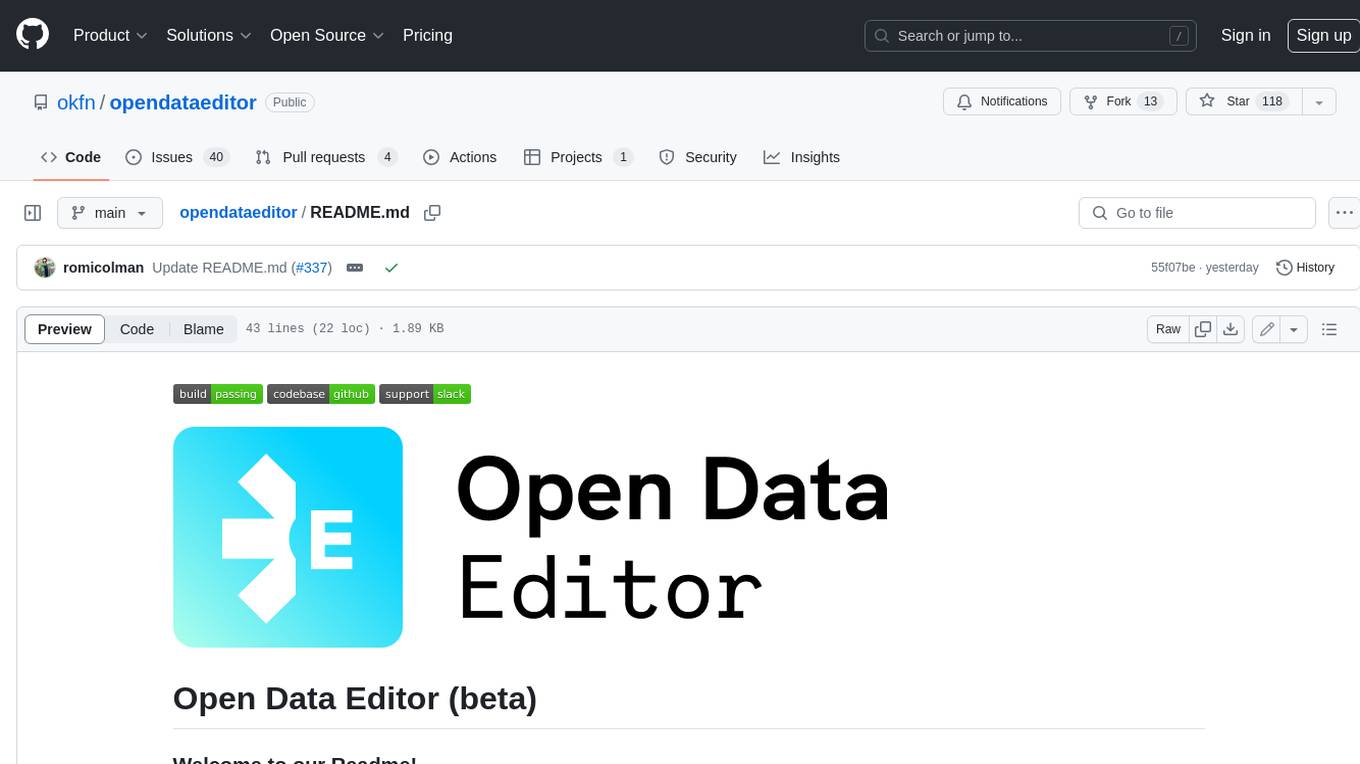
opendataeditor
The Open Data Editor (ODE) is a no-code application to explore, validate and publish data in a simple way. It is an open source project powered by the Frictionless Framework. The ODE is currently available for download and testing in beta.
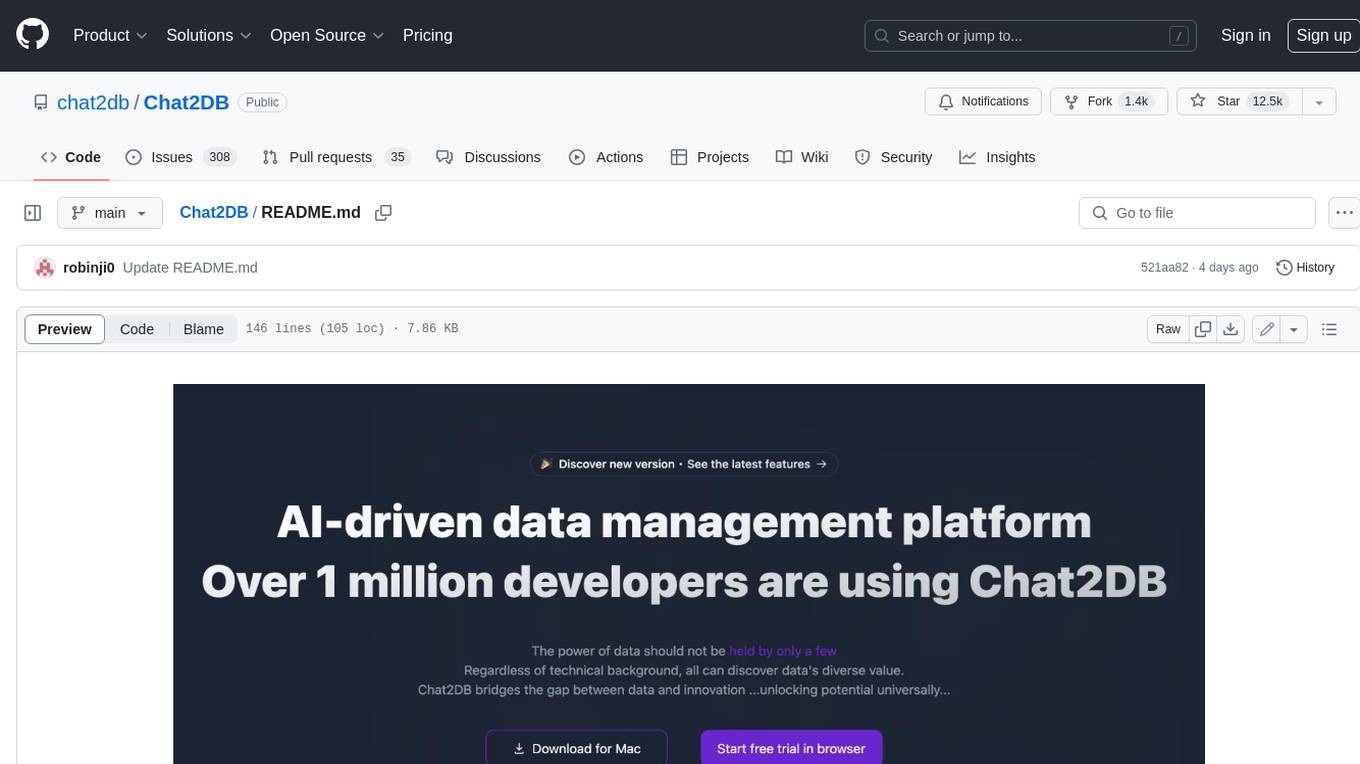
Chat2DB
Chat2DB is an AI-driven data development and analysis platform that enables users to communicate with databases using natural language. It supports a wide range of databases, including MySQL, PostgreSQL, Oracle, SQLServer, SQLite, MariaDB, ClickHouse, DM, Presto, DB2, OceanBase, Hive, KingBase, MongoDB, Redis, and Snowflake. Chat2DB provides a user-friendly interface that allows users to query databases, generate reports, and explore data using natural language commands. It also offers a variety of features to help users improve their productivity, such as auto-completion, syntax highlighting, and error checking.
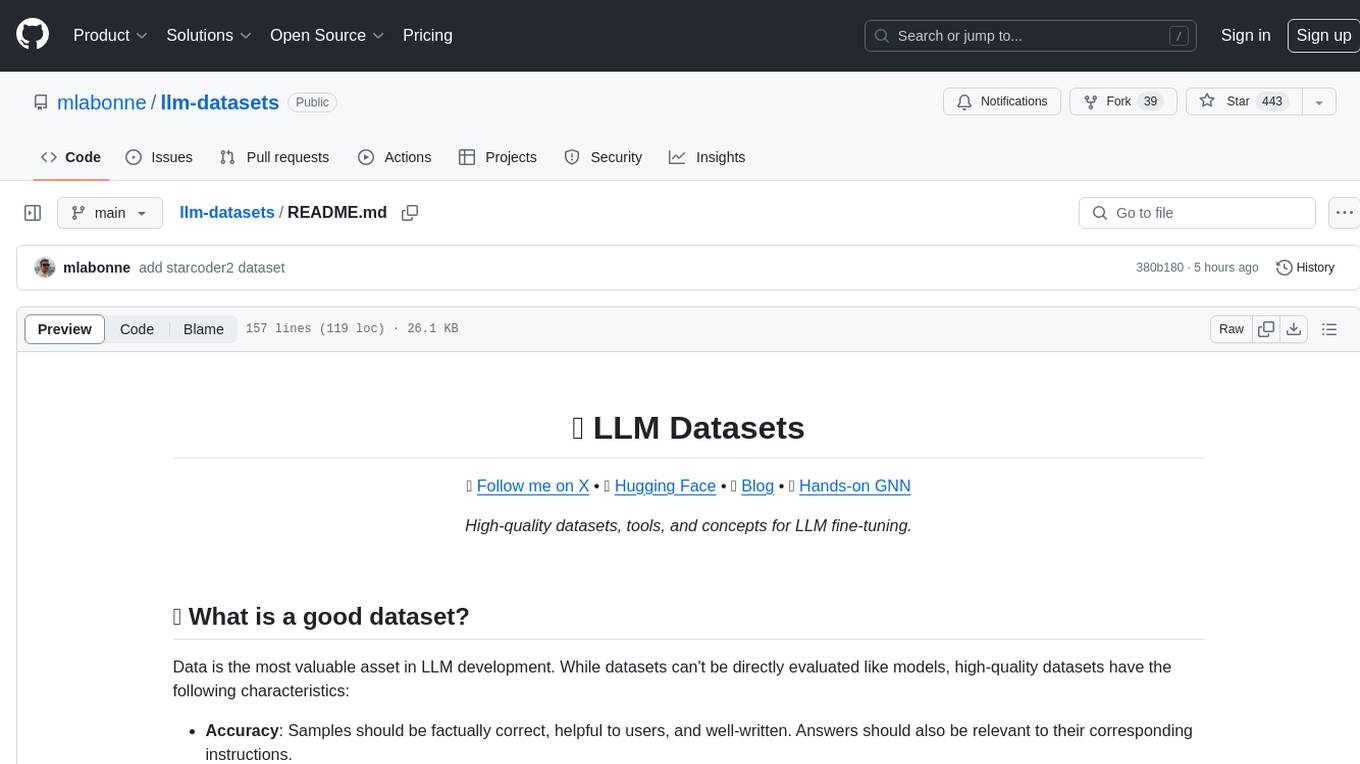
llm-datasets
LLM Datasets is a repository containing high-quality datasets, tools, and concepts for LLM fine-tuning. It provides datasets with characteristics like accuracy, diversity, and complexity to train large language models for various tasks. The repository includes datasets for general-purpose, math & logic, code, conversation & role-play, and agent & function calling domains. It also offers guidance on creating high-quality datasets through data deduplication, data quality assessment, data exploration, and data generation techniques.
For similar jobs

sweep
Sweep is an AI junior developer that turns bugs and feature requests into code changes. It automatically handles developer experience improvements like adding type hints and improving test coverage.

teams-ai
The Teams AI Library is a software development kit (SDK) that helps developers create bots that can interact with Teams and Microsoft 365 applications. It is built on top of the Bot Framework SDK and simplifies the process of developing bots that interact with Teams' artificial intelligence capabilities. The SDK is available for JavaScript/TypeScript, .NET, and Python.

ai-guide
This guide is dedicated to Large Language Models (LLMs) that you can run on your home computer. It assumes your PC is a lower-end, non-gaming setup.

classifai
Supercharge WordPress Content Workflows and Engagement with Artificial Intelligence. Tap into leading cloud-based services like OpenAI, Microsoft Azure AI, Google Gemini and IBM Watson to augment your WordPress-powered websites. Publish content faster while improving SEO performance and increasing audience engagement. ClassifAI integrates Artificial Intelligence and Machine Learning technologies to lighten your workload and eliminate tedious tasks, giving you more time to create original content that matters.

chatbot-ui
Chatbot UI is an open-source AI chat app that allows users to create and deploy their own AI chatbots. It is easy to use and can be customized to fit any need. Chatbot UI is perfect for businesses, developers, and anyone who wants to create a chatbot.

BricksLLM
BricksLLM is a cloud native AI gateway written in Go. Currently, it provides native support for OpenAI, Anthropic, Azure OpenAI and vLLM. BricksLLM aims to provide enterprise level infrastructure that can power any LLM production use cases. Here are some use cases for BricksLLM: * Set LLM usage limits for users on different pricing tiers * Track LLM usage on a per user and per organization basis * Block or redact requests containing PIIs * Improve LLM reliability with failovers, retries and caching * Distribute API keys with rate limits and cost limits for internal development/production use cases * Distribute API keys with rate limits and cost limits for students

uAgents
uAgents is a Python library developed by Fetch.ai that allows for the creation of autonomous AI agents. These agents can perform various tasks on a schedule or take action on various events. uAgents are easy to create and manage, and they are connected to a fast-growing network of other uAgents. They are also secure, with cryptographically secured messages and wallets.

griptape
Griptape is a modular Python framework for building AI-powered applications that securely connect to your enterprise data and APIs. It offers developers the ability to maintain control and flexibility at every step. Griptape's core components include Structures (Agents, Pipelines, and Workflows), Tasks, Tools, Memory (Conversation Memory, Task Memory, and Meta Memory), Drivers (Prompt and Embedding Drivers, Vector Store Drivers, Image Generation Drivers, Image Query Drivers, SQL Drivers, Web Scraper Drivers, and Conversation Memory Drivers), Engines (Query Engines, Extraction Engines, Summary Engines, Image Generation Engines, and Image Query Engines), and additional components (Rulesets, Loaders, Artifacts, Chunkers, and Tokenizers). Griptape enables developers to create AI-powered applications with ease and efficiency.


